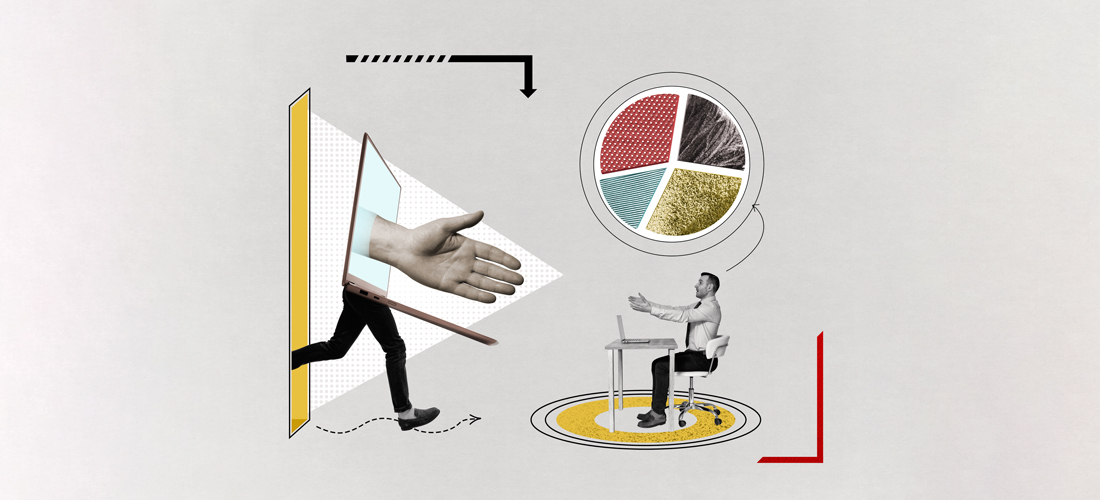Effectively managing power dynamics in negotiation is essential if you’re to reach an agreement that suits your requirements.
Every decision you make plays a pivotal role and helps you achieve an upper hand, and you need to use your advantage wisely.
Yet, the path to success isn't as simple as setting an objective and forging ahead recklessly.
In this article, we’ll bring you expert insights and perspectives from our team of experts, as featured in the Mastering Sales and Negotiations podcast, to ensure you don’t succumb to the risk of compromising your position of power during a negotiation.
Types of negotiation power
To tip the power dynamics in negotiation in your favour, you need to understand the nuances between the different types of power.
Expertise power
Your knowledge and expertise in a particular area improve your standing at the negotiation table. Demonstrating an in-depth knowledge of the subject matter empowers you to shape discussions and decisions.
Relational power
The strength of your relationships within the professional sphere can improve the effectiveness of your negotiations. Building and maintaining alliances develop a network that can be instrumental in garnering support and influencing outcomes.
Informational power
The possession of valuable information provides a strategic advantage. Knowledge about market trends, competitors, or industry insights positions you as a formidable negotiator, capable of making informed decisions.
Coercive power
While not always supported, the ability to apply pressure or assert authority can shape negotiations. It's a delicate balance, but the reasonable use of coercive power can prompt benefits and compliance.
Referent power
This involves the influence derived from personal charisma, trust, and admiration. Your reputation and the trust you inspire can significantly sway decisions in your favour.
Reward power
The ability to give benefits or rewards adds a strategic layer to your negotiations. Promises of favourable outcomes can encourage cooperation, steering negotiations towards mutually beneficial resolutions.
Understanding the impact of power dynamics on decision-making is crucial. The combination of these power dimensions shapes the strategies employed during negotiations.
Recognising when to assert, collaborate, or yield within these power dynamics in negotiation is an art that distinguishes successful mediators.
Identify how power dynamics are used in negotiation, plus transferable negotiation tips, with the Mastering Sales and Negotiations podcast.
Perceived power vs actual power
When it comes to negotiations, understanding the balance between how powerful you seem and how powerful you are can make all the difference.
Perceived power is the impression you create in negotiations. It's shaped by your reputation, communication style, and the impressions you make. When negotiating, this can either work strongly in your favour or pose a subtle challenge.
On the other hand, actual power is what you genuinely offer – your knowledge, skills, authority, and any concrete strengths you have. These are the things that can back up or challenge what people think about you.
Perceived and actual power is important when it comes to power dynamics in negotiation because it outlines what you bring to the table and has a big impact on how negotiations play out.
You need to use perceived power to shape opinions strategically and anchor negotiations in the solid ground of actual power.
Shaun James, Head of Learning and Skills at Huthwaite International, gave his perspective on the role and importance of power dynamics in negotiation.
“The perception of power is a complex topic because it does surround all aspects of negotiation from how you prepare or how you plan and how you behave during the negotiation.
“Perception isn’t a tangible or real thing. If you walk into a negotiation feeling powerful, then the chances are you’ll behave and act powerfully as well. And conversely so.
“We get that power from various sources, i.e. the information that we have to hand, our experience, our status with an organisation. However, we have to remember that in negotiation, there’s a balance of power.
“The opposing party is at the negotiating table because they want to do business with you. While it may not always end up in a deal, there's always a balance. It’s important to recognise what that balance is, plan for it and behave in a way that maximises your power.”
How perception influences power dynamics in negotiation
How you carry yourself during negotiations significantly influences your perception of power.
This influence is particularly pronounced through the interplay of confidence, assertiveness, and communication, each playing a distinct role in shaping power dynamics.
Confidence: the pillar of self-assurance
Confidence plays a pivotal role in shifting the power dynamics in negotiation in your favour. When you portray confidence, it signals a belief in your own abilities and positions, instilling trust and respect from your counterparts.
Maintaining eye contact, expressing ideas with conviction, and showcasing knowledge of the subject matter are key elements that contribute to projecting confidence.
Assertiveness: expressing needs with conviction
Compromise plays a key contribution to effective negotiations. However, there are times when you need to remain assertive and hold your ground to shape a powerful presence in negotiations.
That said, it’s important to remain calm, demonstrate your objectives clearly, and maintain boundaries. You need to strike a balance between assertiveness and cooperation to foster an environment that acknowledges your own needs while respecting the perspectives of others.
Communication: the strategic art of expression
Effective communication serves as a strategic tool in shaping power dynamics during negotiations.
Clarity, precision, and adaptability in conveying messages are paramount. To negotiate effectively, you need to tailor your language to resonate with diverse audiences. This will ensure that your points aren’t only heard, but also understood.
Active listening, articulating your ideas concisely, and adapting your communication style based on the context also contribute to a powerful and influential negotiation presence.
Uncover a wealth of transferable knowledge to help you achieve results aligned with your organisation's goals with the Mastering Sales and Negotiations podcast.
Key tactics for favourable power dynamics in negotiation
Although it’s important not to be overbearing during negotiations, you do need to adopt somewhat of a powerful stance to assert a degree of authority.
Non-verbal cues
Posture and positive body language can help you present yourself confidently and openly.
Use gestures to highlight key points when communicating, and consciously establish and maintain eye contact. This will help you convey sincerity and assertiveness, and portray engagement and confidence in your approach.
Language
Express your ideas clearly and succinctly, avoiding ambiguity. This will ensure your messages are easily understood.
Adopt a confident and assertive tone when you communicate, speak with conviction, and choose your words carefully. Saying the wrong thing, at the wrong time, could harm your negotiation.
Negotiation style
Demonstrate your willingness to collaborate, and find the balance between assertiveness and cooperation. This will help you foster an environment where both parties feel heard and valued.
It’s essential to be adaptable in your negotiation style. Read the room and recognise when to push for your interests and when to adjust your approach based on the evolving dynamics of the conversation.
Emotional intelligence
During negotiations, there are verbal behaviours you can look for to understand the emotions of others to foster a positive atmosphere and navigate sensitive issues. These include:
- Tone of voice
- Intonation
- Pauses and silences
- Repetition
- Qualifiers, e.g. “I feel”, “I believe”, or “I think”
- Questioning style
It’s important to maintain emotional control, particularly in challenging moments. A lack of composure will shift the power dynamics in negotiation.
Active listening
During negotiations, make sure that you actively listen to the concerns and perspectives of others. Demonstrating engagement in the conversation not only reflects respect but also conveys a genuine interest in finding mutually beneficial solutions.
When responding, adopt reflective responses that involve summarising and acknowledging the points raised by others. This practice showcases attentive listening, contributing significantly to fostering a positive negotiation environment.
Consistency
People negotiate best with whom they know, like, and trust. Therefore, being consistent between what you say and what you do is essential to help you build trust and improve reliability between you and the opposing party.
If you commit, be sure to follow through. Not only does this enhance your credibility but also supports the perception of you as a powerful negotiator.
Plan B
Every negotiator worth their salt will immediately recognise that you can’t enter a round of negotiations putting all your eggs in one basket. You must have a plan B in place.
If you enter a negotiation knowing everything hinges on the outcomes of one discussion, the chances are that the opposing party will sense this and take full advantage.
Tony Hughes, CEO at Huthwaite International, highlights the power of having a plan B and not being one hundred per cent reliant on the outcome of one set of negotiations. He stressed the importance of having a fallback plan and how this can improve your overall confidence and power.
“When negotiating, I think the most powerful thing is knowing what happens if you don't get a deal.
“You need to know what your fallback position will be if a deal doesn’t materialise because that’s what gives you power.
“If you’re selling something and you know you've got a great market to sell it to, if you don't make this deal you're going to feel powerful. On the other hand, if you walk into a negotiation, and you don't have anywhere else to sell it, then you've got to have another way of making yourself feel powerful enough to be able to move forward.
“During the preparation and planning process, one of the most important things is planning your fallback option and what’s going to happen if you don't get a deal. If you’ve got lots of alternatives then you’ll feel more powerful.”
How to avoid unbalanced power dynamics in negotiation
Avoiding an imbalance of power is crucial for achieving fair and mutually beneficial outcomes.
Here are some examples of scenarios where power imbalances may occur and advice on how to overcome these battles:
1. Information asymmetry
In negotiations, information is power. Nonetheless, in some cases, you may find yourself in a situation where the opposing party has significantly more information than you.
This can be mitigated by encouraging transparency from the offset, and encouraging the sharing of relevant information, on both sides. If you establish a foundation of trust, this will help you create a more level playing field.
2. Resource disparities
It’s important to focus on the value of contributions rather than sheer quantity. Emphasise the unique strengths and qualities each party brings to the table.
3. Positional power
At times, one party will hold a higher position in the organisational hierarchy, giving them inherent power.
In this case, highlight the merits of ideas rather than relying solely on positional authority, and encourage open dialogue where input is valued regardless of hierarchy.
4. Cultural differences
You won’t always be negotiating with parties from the same cultural background. Oftentimes, the opposing party will comprise diverse cultural backgrounds where power dynamics may be perceived differently.
In these situations, you need to prioritise cultural understanding and sensitivity. Establish clear communication channels to address any cultural misunderstandings.
5. External Influences
External factors, such as market conditions, may disproportionately impact one party.
Acknowledge external factors and focus on aspects within both parties' control. Explore creative solutions to mitigate the impact of external influences.
6. Emotional manipulation
There may be instances when one party resorts to emotional manipulation to gain the upper hand.
Open communication and emotional intelligence are crucial in overcoming this tactic. You need to address manipulation tactfully and redirect the focus to the matter at hand.
7. Time pressures
Pressure tactics are commonly used in negotiations, and are widely considered to be a ‘dirty trick’. If the other party attempts to impose unrealistic time constraints to gain an advantage don’t give in and crumble under pressure.
Be sure to establish realistic timelines and negotiate deadlines that are fair for you both, and hold firm to overcome difficult negotiation tactics such as this.
In general, promoting open communication, transparency, and a focus on shared interests rather than individual benefits can help reduce the likelihood of unbalanced power dynamics in negotiation.
Instead, you need to strive for a negotiation environment where all parties feel empowered to contribute, and decisions are made collaboratively. If challenges persist, consider involving a neutral third party, such as a mediator, to facilitate a fair and equitable negotiation process.
Get the free whitepaper to learn how you can achieve more mutually beneficial outcomes in negotiations.







